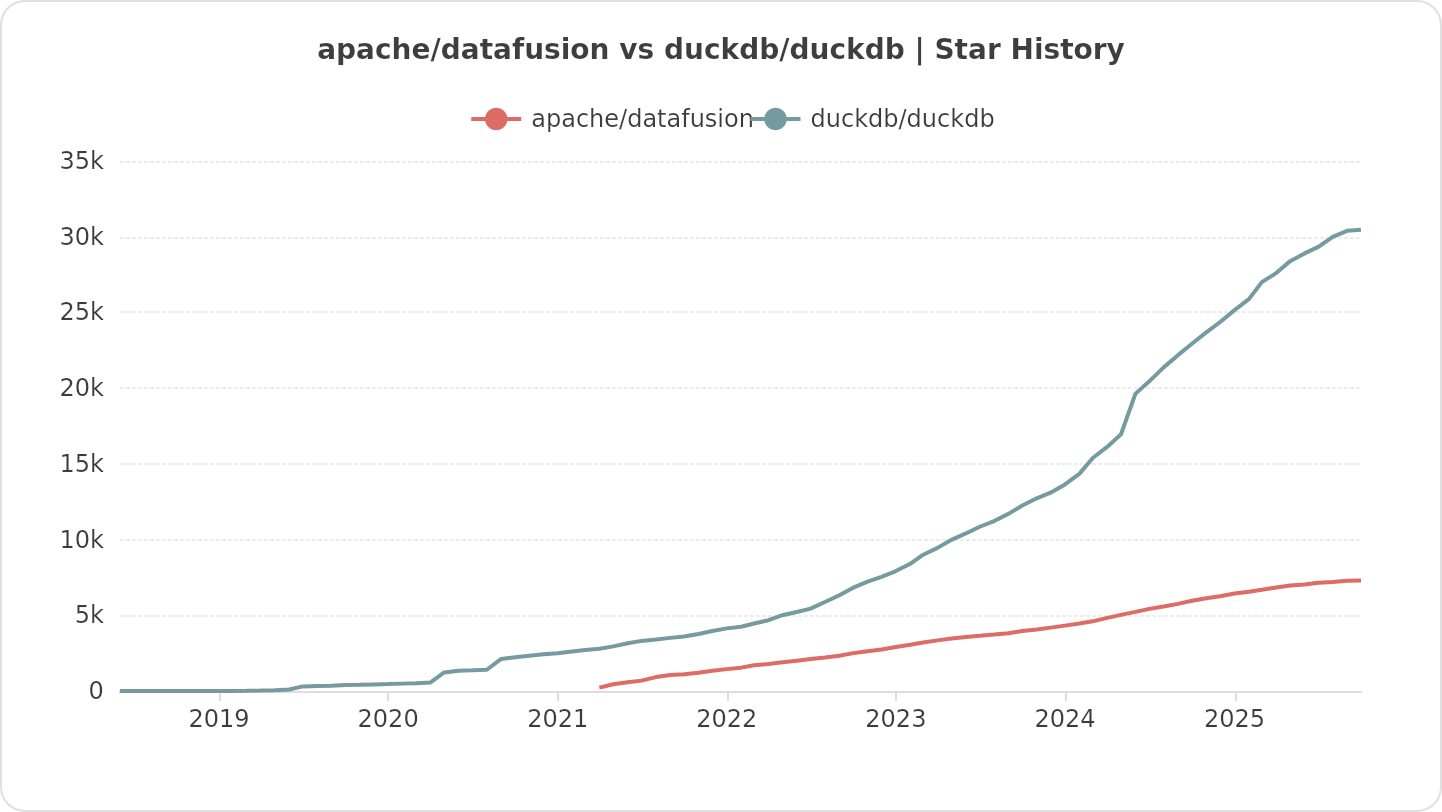Comparing DuckDB and Apache DataFusion
DuckDB and Apache DataFusion are two shining technologies the data community is excited about. Both offer powerful data processing capabilities but differ in their architecture, community support, and use cases. This article compares DuckDB and Apache DataFusion to help you choose the right tool for your data processing needs.
Community
DuckDB is developed by the DuckDB Foundation, ensuring focused development and strategic direction. One of the main supporters MotherDuck offers a cloud version that supports hybrid processing. Mainly Analytics and ETL companies utilize DuckDB, showcasing its reliability and performance. DuckDB’s commercial partnerships and foundation approach ensure ongoing innovation and support, the companies pay to be part of the membership club and the foundation makes sure the project is well-funded and aligned with both community and commercial products.
Apache DataFusion benefits from the broad and diverse community of the Apache Software Foundation. Contributions from various organizations and individuals drive continuous improvement and innovation. At the time being, there are more than 10 PMC members and they include NVIDIA and Apple. And startups like Posit, Synnada, and Influxdb.

Database Architecture
DuckDB offers a streamlined architecture for single-node analytics, optimized for read-heavy scenarios with its unique columnar storage format. Written in C++, it ensures high performance and efficiency. DuckDB has zero-copy integration with Apache Arrow, enhancing interoperability. More details on DuckDB's Arrow integration can be found here. DuckDB’s advanced SQL features, including macros and GROUP BY ALL, position it as a leader in SQL innovation. However, DuckDB's main limitation is its lack of support for scaling across multiple nodes, although MotherDuck aims to address this with a hybrid architecture.
Apache DataFusion features a modular architecture supporting distributed data processing, making it suitable for scalable environments. Developed in Rust, it provides safety and performance benefits and it's stateless, unlike Duckdb which has its database format. DataFusion excels in streaming and distributed scaling, particularly for machine learning applications, with native support for reading from Kafka.
Long term, I believe Duckdb will try to endorse its database format and focus on SQL interface, making it win over Parquet and Arrow while keeping the compatibility. DataFusion on the other hand, seems to focus more on making stream processing hassle-free for big data, using Rust and SQL compatibility.
Interoperability
DuckDB integrates seamlessly with various programming languages including TypeScript, Java, Golang, and native Python. It supports both in-memory and persistent disk formats (details), making it highly versatile.
Apache DataFusion emphasizes interoperability through well-known standards like Apache Arrow and Parquet. Both tools support Apache Iceberg and Delta Lake, but DataFusion currently requires Rust for these features, limiting its SQL interface. More on integrating Delta Lake with DataFusion can be found here. If DuckDB focuses on its own database format over time, Datafusion will probably gain advantage in this area as it's focus is solely on Arrow and Parquet.
Both DuckDB and DataFusion offer smooth installation via CLI tools. DuckDB’s getting started guide is more comprehensive compared to DataFusion’s usage guide. Both support querying data on the fly from local or remote files in your data lake.
While DuckDB has its own database format, DataFusion relies on Arrow and Parquet files for data storage. DuckDB’s SQL interface is more user-friendly for beginners, while DataFusion requires familiarity with Rust for advanced features.
Performance
It looks like DataFusion is catching up with DuckDB but it seems to perform more consistent on querying Parquet files.
Duckdb's own database format still performs better but the gap is probably going to be less over time, making performance not the main differentiator between the two.
Conclusion
DuckDB has a huge advantage being installed in many data people's laptops.


I assume NVIDIA, Apple and Alibaba has much more installs in their clusters but I'm not sure about their production usage. DuckDB's main interface is SQL and they heavily lean on it, while DataFusion bets on Rust and Arrow.
Both technologies are here to stay. DuckDB will continue investing in SQL and community features through their Foundation and commercial partnerships. Apache DataFusion’s adoption by companies like NVIDIA, Apple, and Alibaba highlights its strength in streaming and distributed processing, making it a top choice for large-scale data processing needs.
